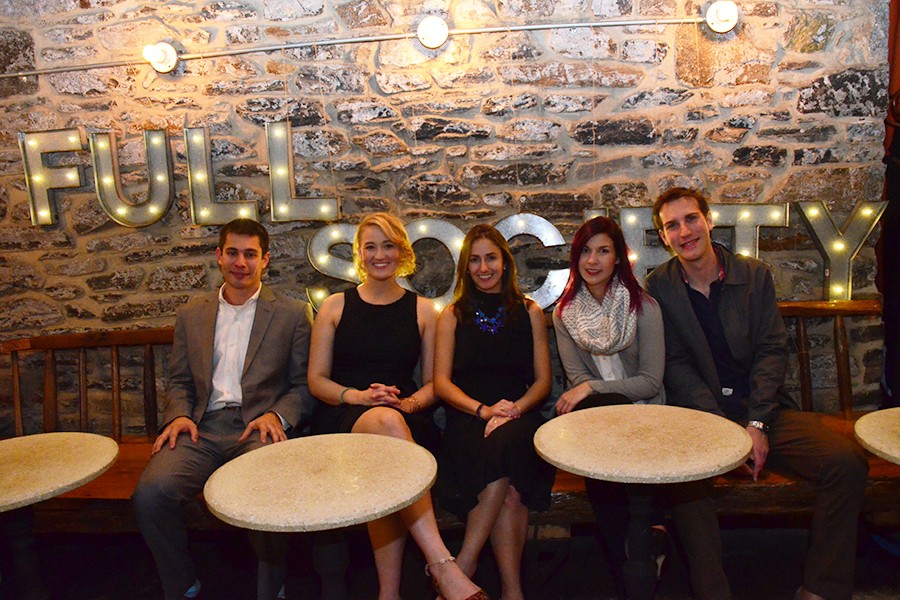Nothing has the potential to kill the charm of an evening out with friends quite like trying to split a restaurant bill. Figuring out the math and factoring in the right tip can be tricky. It can also lead to personal tensions as the payment process drags out.
Well, now there's an app for that.
Full Society, which originated at the Johns Hopkins Carey Business School, allows restaurant-goers to instantly pay, split, and tip from their smartphones. There's also a philanthropic component: At the end of payment, users are encouraged to pitch in a donation to a local nonprofit that works on hunger issues.
A beta version of the app launched Sunday at a handful of restaurants in Baltimore, including Woodberry Kitchen. Dozens more are scheduled to join.
The goal, says Full Society CEO Paige Cantlin, is to officially release the app to the public this winter—in February for iPhones, and about a month later for Androids. In the meantime, people can sign up to try out the app during its pilot phase. About 200 beta users are already registered, says Cantlin, who's working on earning her MBA at Carey.
Eventually the platform could expand to other cities, but right now the focus is Baltimore, where Full Society has spanned neighborhoods to introduce the technology to local eateries. In addition to Woodberry Kitchen, which is a stakeholder in the company, the initial group of participants includes Grand Cru, Parts & Labor, The Nickel Taphouse, Le Garage, Encantada, and Birroteca's two locations (one in Baltimore and one in Bel Air). Artifact Coffee, Mezze, Kali's Court, and Anastasia are expected to join soon, and more than 60 others signed up in advance to participate at some point next year, as Full Society builds its technology, Cantlin says.
The free app allows users to set up their payment method (i.e., PayPal) on their phone in advance. Multiple users at the same table can split their bill on the spot, based either on the items they ordered or percentages. And when they're done, they can simply sign off on the payment and leave the restaurant—no more waiting around for credit cards to be processed.
For the restaurants, which pay for installation and a monthly fee, Full Society touts benefits like faster table turnover, fewer paper receipts, and the ability to collect data. The app works by integrating with restaurants' existing point-of-sale systems and automatically connecting to diners' phones via beacon technology.
And for the nonprofit partners, the goal is to provide funds for "one meal for someone in need locally for every table that pays their bill through our app," according to Full Society. The team estimates this equates to a donation of about $1.25 per meal from the app's users. (Users can, however, choose to donate more, less, or none at all.) The current list of local recipients includes Paul's Place, Helping Up Mission, Moveable Feast, and the Maryland Farmer's Market Association.
Full Society got its start in an Entrepreneurial Ventures class Cantlin took last fall at Johns Hopkins, where she and a team of classmates were tasked with creating a product that could work for the hospitality industry.
"We did a lot of market research and interviewed restaurant owners, and studied the technology in restaurants," Cantlin says.
The element of addressing local hunger issues was there from the start, Cantlin says. In a survey her team conducted, 90 percent of respondents said they'd be willing to make donations through the app.
Eventually Cantlin—who earned a BA in economics from Johns Hopkins in 2009 and hopes to complete her MBA in the spring—took over the project with a new team that includes her sister Lauren and the Chalk + Chisel digital development company. They entered the new startup into an Innovation Factory showcase and the annual Business Plan Competition at Johns Hopkins last year.
The team received significant funding breaks with a $25,000 award through the Accelerate Baltimore incubator program, and also with an Indiegogo crowdfunding campaign that netted just over $26,000.
One of the more difficult parts of the process was getting restaurants on board.
"We had to go on foot, door to door, talking to different restaurants seeing who would be willing to take part in our new venture," Cantlin says.
Over time Full Society hopes to get at least 100 restaurants in Baltimore using the app before the team explores the possibility of branching out to other cities.
Posted in Science+Technology
Tagged entrepreneurship, startup









